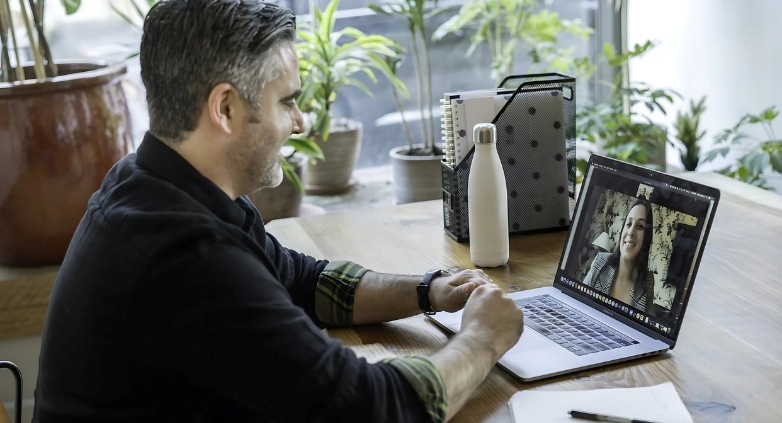
Are Virtual Addiction Recovery Programs Effective?
The landscape of addiction recovery is evolving, with more people than ever turning to virtual addiction recovery programs for help.
Recent data shows that telehealth adoption surged by 154% during the COVID-19 pandemic, forever transforming how healthcare is delivered.
Real people. Real support.
Seeking Help for Yourself or a Loved One?
Connect with our professionals to start the journey to recovery.
Call 860.388.9656 for immediate support.
So, are virtual addiction recovery programs effective?
Yes—research and real-world outcomes show that virtual programs can be highly effective, offering convenience, accessibility, and personalized support that rivals in-person care. While they come with unique challenges, studies indicate that online recovery services can lead to meaningful, long-term success.
In this article, we’ll explore the benefits and limitations of virtual addiction recovery, comparing it to traditional in-person treatment to help you make an informed decision.
If you’re seeking personalized addiction care, consider Project Courage’s services.
Let’s dive in:

The Growth of Virtual Addiction Recovery Programs
The rise of virtual addiction recovery programs is largely tied to advancements in telehealth and the global pandemic that made remote services a necessity.
Today, telehealth addiction services include options like individual counseling, group therapy, medication management, and virtual support groups.
Programs like these have made addiction treatment more accessible to people who may have faced barriers like transportation issues, social stigma, or lack of local resources. In particular, in-home recovery services are closely connected to virtual care, offering hybrid models that blend telehealth with in-person support.
This shift isn’t just a trend—it’s a vital tool in the recovery landscape. Online recovery programs and remote addiction therapy provide care to individuals who would otherwise fall through the cracks.
Free Download
Proven Programs for Lasting Recovery
Receive your free guide to understanding alcohol addiction and discovering recovery programs tailored to you. Learn how to build a personal sobriety plan and get support every step of the way.
Benefits of Virtual Addiction Recovery Programs
According to Statista, in 2022, there were 17,353 substance abuse treatment facilities in the U.S., with the highest number found in California.
While the availability of treatment options is significant, access to these facilities may still be limited for people in remote areas, making virtual recovery programs a crucial solution for reaching underserved populations.
Virtual addiction recovery programs come with a range of advantages, making them a valuable option for many.
Some key benefits include:
- Accessibility: Virtual options eliminate geographical and logistical barriers, allowing people in rural areas or without reliable transportation to access care. This accessibility answers a crucial question: “Are virtual addiction recovery programs effective for those in underserved areas? The answer is a resounding yes, as they provide solutions where traditional methods might fall short.
- Affordability: In many cases, online addiction therapy can be more cost-effective than in-person treatment due to lower overhead costs, making recovery more accessible to a broader audience.
- Flexibility: Patients can schedule sessions around work, school, or family commitments, making it easier to prioritize their recovery journey.
- Privacy: Seeking addiction treatment online can feel less intimidating, especially for those who are hesitant to seek help in person.
At Project Courage, virtual programs are designed with these benefits in mind, allowing individuals to take the first step toward recovery with confidence.

How Virtual Programs Compare to In-Person Treatment
When evaluating the effectiveness of virtual recovery, it’s essential to compare virtual care to traditional, in-person treatment:
- Cost: Virtual programs are generally more affordable, making them an excellent entry point for those with financial constraints.
- Accessibility: In-person programs often require travel, which isn’t feasible for everyone, whereas online options remove these barriers.
- Success Rates: Studies show that the success of online recovery programs largely depends on individual needs. People with mild to moderate substance use disorders tend to respond well to virtual care, while severe cases may require the structure of in-person services.
Hybrid models, such as Intensive Outpatient Programs (IOP), blend virtual and in-person care to deliver the best of both worlds. Incorporating family therapy and support groups, Project Courage’s family services are tailored to meet the unique needs of every household.

The Role of Family in Virtual Recovery Programs
Family involvement is a critical component of long-term recovery.
But are virtual addiction recovery programs effective in engaging families?
The answer lies in their ability to provide convenient and accessible options for loved ones to participate actively. Through virtual addiction recovery programs, family members can join therapy sessions and support groups from the comfort of their homes, removing logistical barriers.
Options like virtual family therapy and family support groups strengthen relationships and improve communication, both of which are essential for sustained recovery. By including families in the process, virtual programs create a supportive network that helps individuals stay on track.

How Project Courage’s Virtual Recovery Services Stand Out
At Project Courage, virtual addiction treatment isn’t just a convenience—it’s a personalized experience. Each program is tailored to meet individual needs, ensuring that patients receive the right level of care at every stage of their journey.
Virtual services can also act as a stepping stone to more intensive care, such as in-home recovery or Intensive Outpatient Programs. With a focus on family engagement, accountability, and long-term outcomes, Project Courage provides a unique approach that sets it apart.
Real people. Real support.
Seeking Help for Yourself or a Loved One?
Connect with our professionals to start the journey to recovery.
Call 860.388.9656 for immediate support.
If you’re ready to take the next step, contact us today.
Case Studies & Testimonials
Hearing real stories from those who have walked the path of recovery can be incredibly powerful. At Project Courage, many individuals and families have experienced life-changing results through virtual addiction recovery programs.
To explore these inspiring journeys, including video testimonials that showcase personal stories of transformation and hope, visit Project Courage’s Stories.
FAQ
Yes, for many individuals, virtual programs can be just as effective, especially for mild to moderate substance use disorders. However, those with severe addiction or co-occurring mental health issues may benefit more from in-person or hybrid treatment options.
Virtual programs typically include individual counseling, group therapy, medication management, and family therapy. These services are designed to provide comprehensive care and support.
Family members can play an active role by participating in virtual therapy sessions and support groups. Family involvement is crucial to long-term recovery. Learn more about family participation.
While virtual programs can be effective for many, severe addiction cases often require more structured care, such as in-person treatment or hybrid models like intensive outpatient programs.
Do you have more questions?
For additional answers, visit Project Courage’s FAQ page.
Free Download
Proven Programs for Lasting Recovery
Receive your free guide to understanding alcohol addiction and discovering recovery programs tailored to you. Learn how to build a personal sobriety plan and get support every step of the way.
Choosing the Right Path to Recovery
In conclusion, are virtual addiction recovery programs effective? For many individuals, the answer is yes. These programs offer
Virtual addiction recovery programs offer accessibility, affordability, and flexibility, making them an excellent choice for many individuals. While they come with challenges like reduced personal connection and technological barriers, they are highly effective for mild to moderate cases of addiction.
Family involvement remains a cornerstone of successful recovery, and virtual programs offer innovative ways to keep loved ones engaged. Whether as a standalone service or a stepping stone to in-person care, Project Courage’s virtual services provide a personalized path to recovery.
If you or someone you love is ready to begin the journey, explore family-focused recovery options or contact Project Courage for guidance today.


